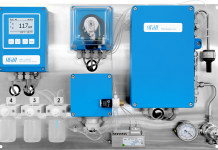According to a new report Carbon Capture and Storage (CCS) deployment must be viewed as an urgent priority if the world is to achieve the global warming limits identified in the Paris Agreement.
Launched by the CCS Forum, the report urges policy-makers and governments to avoid focusing on the near-term targets to the detriment of long-term goals.
Written by a group of experts from academia, industry, and government supported by the Institution of Chemical Engineers (IChemE) Energy Centre, the UK Foreign and Commonwealth Office, the Royal Society of Chemistry and Imperial College London, the report was developed following a three-day CCS Forum conference, held at the Royal Academy of Engineering in February 2016.
Focusing on the Paris Agreement, in which the world agreed to limit global warming to 2oC, the report says that 120-160 gigatonnes of CO2 will have to be stored until 2050. Research findings from the CCS Forum experts show that the capacity to do this are available through oil and gas reservoirs, unminable coal seams and deep saline aquifers.
The report highlights the need for funding if the technology is to help tackle climate change and comes after significant cuts to CCS were made by the UK government at the end of last year.
Professor Stefaan Simons, IChemE’s Energy Centre Chair and Dean of the College of Engineering, Design and Physical Sciences at Brunel University London, said: “We no longer have the luxury of prevarication. CCS offers an opportunity to decouple the use of fossil fuels from climate change.
“The CCS Forum report is an important step in the future prospects for CCS, as, for the first time, it suggests radical ways in which we can rethink the economic and technological development of the process, making it more attractive to investors and government decision-makers alike. Without such changes in perspective, we will not get past the barriers to deployment and, more importantly, we risk not meeting our carbon reduction goals in time to mitigate disastrous climate change.”
Lead author Dr Niall MacDowell, from IChemE’s Energy Centre and Imperial College London, said: “Our report represents the views of leading CCS experts from around the world, including power and industry, capture, utilisation, transport and storage, and identifies the key research and development needs for this area for the coming decade. I hope this will provide a meaningful contribution to CCS cost reduction and help remove the final barriers to the deployment of this vital technology.”
The Energy Research Partnership’s Andy Boston said: “Decarbonising the power system requires generation technologies that are not just low carbon, but are also dependable and flexible. CCS stands head and shoulders above other technologies in providing all that is required to keep the lights on whilst providing a pathway to large-scale industrial decarbonisation.”
Consortium starts work on carbon capture programme
A contract that puts Teesside at the forefront of carbon capture and usage technology has been awarded by Teesside Collective, the cluster of energy-intensive industries working together to establish Europe’s first clean industrial zone.
A consortium of Pale Blue Dot Energy, Costain and the UK Centre for Carbon Dioxide Utilisation at the University of Sheffield has been commissioned to design a CO2 capture unit at Lotte Chemical at Wilton, near Redcar, and develop a business case to sell the CO2.
Lotte makes PPT needed by major soft drink brands for the manufacture of 15 billion recyclable drinks bottles every year. It produces about 55,000 tonnes of CO2 annually and a capture plant would capture 90% of that.
The consortium will also design a demonstration centre on Teesside which can be used by companies wanting to scale up ‘near to market’ carbon utilisation technologies, mostly for heavy industrial processes such as the manufacturing of aggregates, fertilisers and other chemicals.
Pale Blue Dot will be leading project management and working on business and commercial models. Costain will be engineering the carbon capture unit at Lotte and the UK Centre for Carbon Dioxide Utilisation at the University of Sheffield will be designing the demonstration centre and commercial and operating models.
The Government is providing funding for Teesside Collective to continue to scope out the possibilities offered by industrial CCS in the North East.














